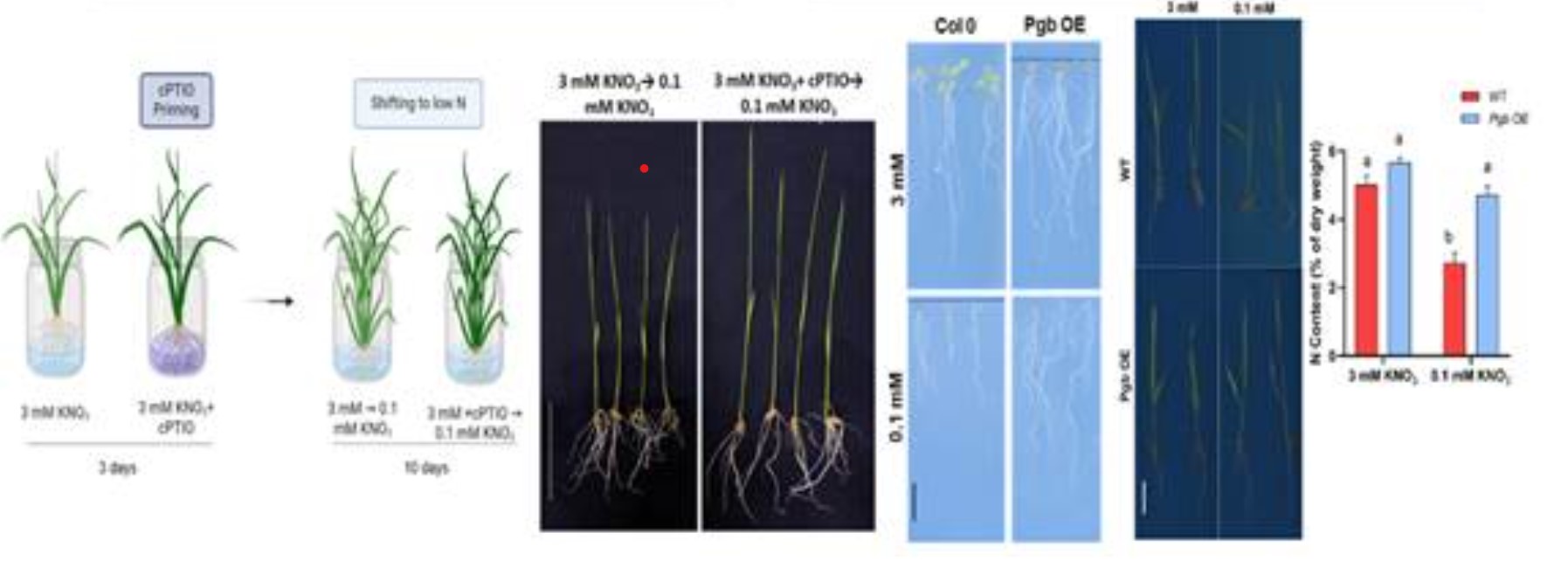New Method to Improve Nitrogen Use Efficiency (NUE)

- 10 Jan 2025
In News:
A recent breakthrough in agricultural research offers a promising solution to improve Nitrogen Use Efficiency (NUE) in crops, particularly in rice and Arabidopsis, by reducing nitric oxide (NO) levels in plants. This innovative approach provides an environmentally sustainable way to enhance crop yields while minimizing the need for synthetic nitrogen fertilizers, which have significant ecological and economic drawbacks.
Key Findings and Research Overview:
- Reducing NO Levels: The study, conducted by researchers at the National Institute of Plant Genome Research (NIPGR), demonstrated that by reducing nitric oxide (NO) levels in plants, nitrogen uptake could be significantly improved. This leads to a better NUE, a crucial factor for enhancing crop yield sustainably.
- NUE and Its Importance: NUE refers to the efficiency with which plants use nitrogen for biomass production. Improving NUE allows for higher crop yields with less fertilizer input, reducing costs and minimizing nitrogen-related environmental pollution.
- Traditional Approaches and Their Limitations: Current techniques to improve NUE primarily rely on the use of inorganic nitrogen fertilizers. These methods, though effective, have several downsides:
- They involve high operational costs for farmers.
- Excessive fertilizer use contributes to the emission of nitrogen oxides (NOx) and other pollutants.
- The production of these fertilizers also contributes to greenhouse gas emissions.
In contrast, the new study proposes a genetic and pharmacological manipulation of NO levels, offering a sustainable alternative to these traditional, resource-heavy methods.
Study Methodology:
The research team employed both genetic and pharmacological approaches to regulate NO levels in plants:
- Phytoglobin Overexpression: By overexpressing phytoglobin (a natural NO scavenger), the researchers increased the expression of high-affinity nitrate transporters (HATs) like NRT2.1 and NRT2.4. These transporters are essential for efficient nitrogen uptake.
- NO Donor and Scavenger Treatments: Plants were treated with NO donor (SNAP) and NO scavenger (cPTIO) to monitor the effects on NUE.
- Results: The treatment led to more efficient nitrogen uptake, especially under low NO conditions, by enhancing the expression of HATs. This method could increase plant growth and nitrogen utilization without relying on excessive fertilizer use.
Significance and Impact:
This research provides a pathway to enhance crop yield sustainably by addressing one of the most critical challenges in modern agriculture—reducing the reliance on nitrogen fertilizers. By modulating NO levels to regulate nitrogen uptake, this approach offers:
- Reduced need for synthetic fertilizers, lowering farmers' operational costs.
- Minimized environmental impact, including lower nitrogen oxide emissions and less nitrogen runoff.
- Improved nitrogen uptake efficiency, ensuring better crop yields, especially under conditions with limited nitrogen availability.
Broader Implications:
- Global Nitrogen Challenges:
- The overuse of nitrogen fertilizers has been a major driver of nitrogen pollution, leading to issues like eutrophication, biodiversity loss, and climate change.
- According to the Food and Agriculture Organization (FAO), excessive nitrogen use has worsened environmental conditions globally, while many regions, particularly in low-income countries, suffer from nitrogen depletion, which reduces crop productivity.
- Health and Environmental Risks:
- Nitrogen pollution contributes to health issues like methemoglobinemia (blue baby syndrome) and various long-term diseases.
- Nitrogen compounds also play a role in greenhouse gas emissions, further exacerbating climate change.
- Future Directions for Sustainable Agriculture:
- This study highlights the need for innovative nitrogen management strategies, integrating both biological and genetic approaches to optimize nitrogen use.
- Research is underway to develop NO scavenging formulations and identify bacteria that could be used in soil to enhance NUE in plants.
- Policy Recommendations:
- Governments should focus on reducing the environmental and health impacts of nitrogen fertilizer production and usage by promoting sustainable farming practices.
- Encouraging biological nitrogen fixation through crops like soybeans and alfalfa, and investing in low-emission fertilizers, can help mitigate nitrogen pollution.
